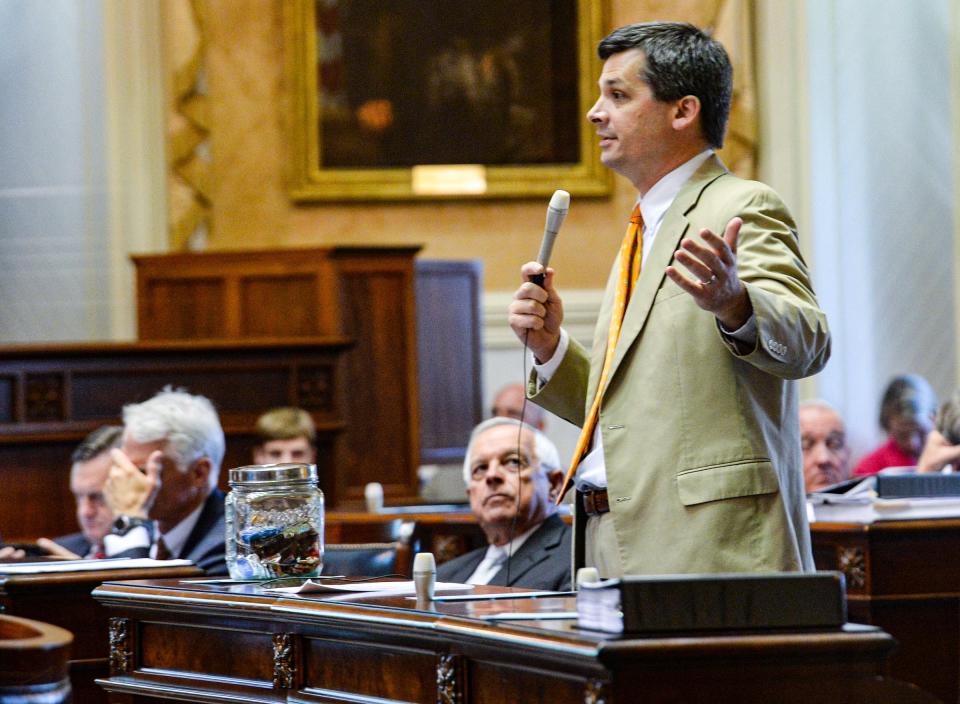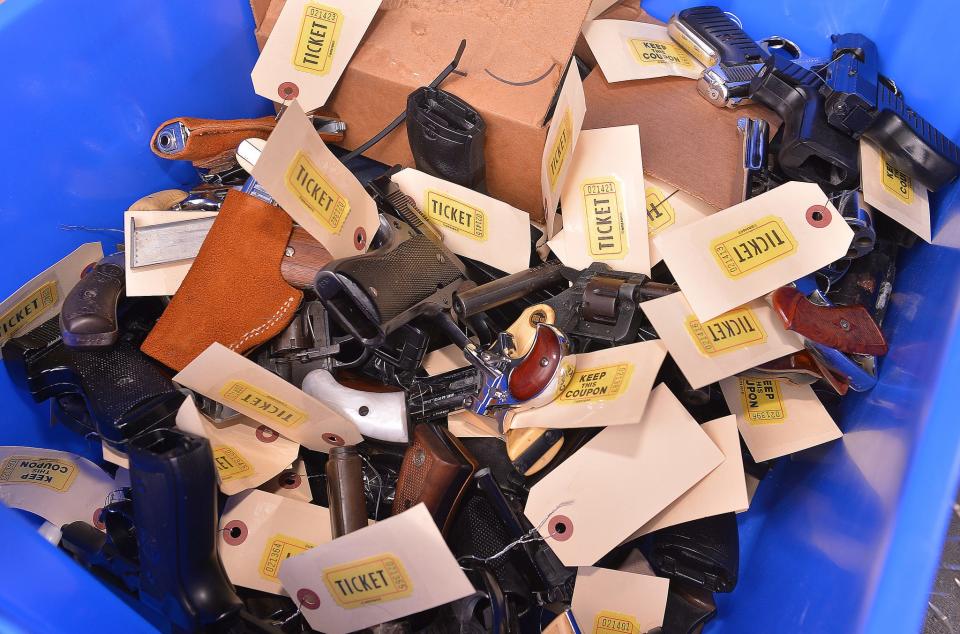Funding of religious schools, abortion access: SC legislation to watch for in 2023 session
There will be a lot of new things about the South Carolina General Assembly in 2023. The legislature will begin its two-year schedule with a new House Speaker and a far more conservative Republican set of representatives following the 2022 midterm election.
Yet, based on bills lawmakers pre-filed over the last couple of weeks, the trajectory of lawmaking in the state hasn't changed by much.
Conservative Greenville CountySC pushed further toward Republicans, election data shows
Here are five issues that are likely to dominate the statehouse when the new session convenes Jan. 10 with 27 new House members:
Funding for SC religious schools and education voucher programs
South Carolina's constitution bans the state from funding religious, private educational institutions.
Now, the new House Speaker Murrell Smith, R-Sumter, has moved to put the question of whether the ban should be repealed into a ballot initiative.
If H.3591 passes, SC voters may find the following question when they vote during the 2024 general election:
"Must Section 4, Article XI of the Constitution of this State be repealed so as to eliminate the prohibition against the State or its political subdivisions providing direct aid to religious or other private educational institutions?"
The language of the ballot comes from the 2022 U.S. Supreme Court ruling, which paved the pathway for states to directly fund religious schools. While conservative judges said that barring religious schools from being funded was discriminatory, liberal judges said the decision eroded the separation between church and state.
Last session: 'Not what our state needs': Educators on proposal to use public money for private schools
South Carolina has a long, storied history of trying to engineer indirect pathways to fund religious schools. For instance, it has previously attempted to pass voucher programs that would use money designated for public schools into private, religious schools.
However, the last session was the closest it had advanced to becoming law.
Earlier this year, the "education savings account" bill, which would've set up accounts for low-income, special needs students using public money, found great support from leadership in both sides of the chamber. Public education advocates were distressed by the bill since it had no measures to prevent private, religious schools in SC from discriminating against students on the basis of religion and sexual orientation.
Senate Majority Leader Shane Massey, who was at the forefront of passing the voucher bill and had added clauses to cover Medicaid dependent low-income students, ultimately blocked the bill because he did not think that the bill had enough accountability measures.
Massey had indicated last session that the voucher bill may make a comeback.

Restricting LGBTQ healthcare in SC
Sen. Danny Verdin, R-Laurens, introduced bills, S. 274 and S. 276 that would target transgender youth and limit gender-affirming healthcare access for anyone under the age of 21. S.274 would prohibit doctors from providing an umbrella of care such as hormone therapy, counselling and genital surgery.
Despite scientific studies and medical associations recognizing gender affirming care as being of utmost importance when it comes to protecting transgender youth from abuse and suicide, Republican lawmakers across the country have continued to target trans youth by hyper-fixating on biological sex and its conflict with gender roles. This type of a fixation led to the passing of the anti-trans sports bill, "save women's sports" last session.
The act prohibited trans youth from competing in teams that didn't match their biological sex at birth, even as several advocates brought up that there weren't enough cases in the SC to warrant an act of this kind.
Abortion access in South Carolina
Once the U.S. Supreme Court overturned Roe v. Wade, lawmakers convened a special session up until November to pass a near-total abortion ban. This ban would've prohibited abortion access from the time of conception but with exceptions for pregnancies arising from rape, incest and in case there was a danger to a mother's life.
However, lawmakers failed. Democrats and GOP senators Katrina Shealy, Sandy Senn and Tom Davis banded together to vote against a measure that tipped a six-week ban into a total ban. The next step, the conference committee formed to hash out differences, also failed.
New abortion bans are likely to take precedence in the roster, especially after the SC Supreme Court comes out with its ruling.
The SC Supreme Court is set to decide whether the state violated the constitution and the privacy rights granted by it after it passed the controversial six-week abortion ban last year. Its judgment will decide the length and breadth of the legislature's power to interfere with individual rights if it's in the state's interest.
Gun legislation and broadening the scope of constitutional carry in SC
GOP lawmakers on both the House and Senate side have introduced bills that would dilute the requirement of concealed weapons permit. Their bills would amend state law to make it lawful for anyone to carry a handgun, whether concealed or not, anywhere they want, except for spaces such as doctors offices, courtrooms, school properties, law enforcement centers among others.
However, if passed, the new changes would allow guns if the authorizing body of say a medical facility permits it.
From the gun safety side, Rep. Ivory Torrey Thigpen, D-Richland introduced a bill that would introduce a version of a "red flags" bill.
2021Gov. McMaster signs Open Carry with Training Act as SC prepares for law to take effect Aug. 15
Red flag laws allow law enforcement or family members to petition courts to temporarily remove guns from individuals if they pose a danger to themselves or others, according to The Poynter Institute's PolitiFact. Thigpen's bill would allow courts to assess the situation by looking at instances of recent threats or acts of violence towards others and to themselves, acts of cruelty to animals, reckless use, display, or brandishing of a firearm by the person among others.
Though several Upstate Republicans have said they would not support any type of red flag laws.

SC still has no hate crime law
South Carolina is one of two states that continues to resist the call to institute a hate crimes law. Last session, the House passed the hate crimes law, which would have enhanced penalties for bias-motivated crimes. Bias motivated crimes are crimes that occur due to the perpetrator's prejudice related to sexual orientation, race, religion, national origin among many.
Repercussions Could the lack of a hate crimes bill hurt job growth in South Carolina?
But the senate blocked it. Sen. Shane Massey said that there were over 10 senators, many from the Upstate, who would not vote to bring the bill to the floor. Sen. Josh Kimbrell, R-Spartanburg said that senators did not accept LGBTQ protections in the bill and would only support the bill if those were removed.
Pre-filed legislation by Rep. Wendell Gilliard, named after late Sen. Clementa C. Pinckney, who was a victim of the attack on Charleston's Mother Emanuel Church by white supremacist Dylann Roof, has renewed the effort to pass the bill.
Devyani Chhetri covers the South Carolina State House and is a watchdog SC government reporter. You can reach her at dchhetri@gannett.com or @ChhetriDevyani.
This article originally appeared on Greenville News: Religious schools, abortion: SC legislation to watch for in 2023

